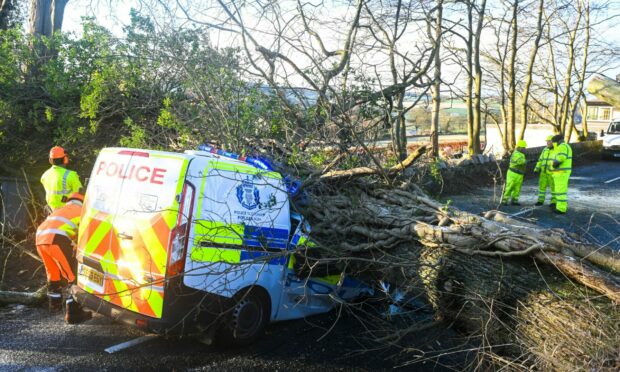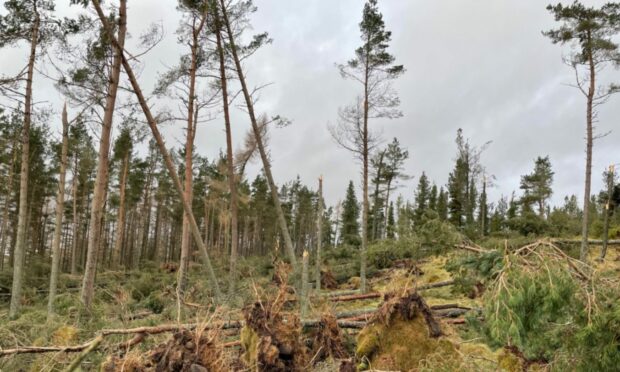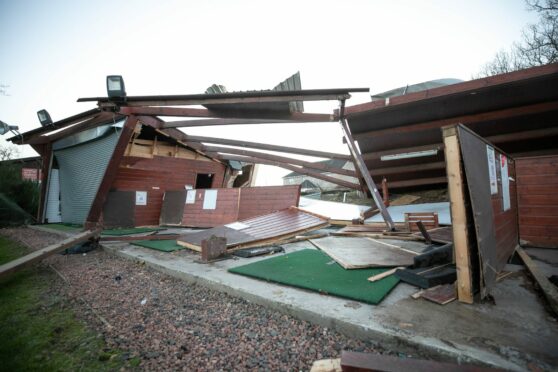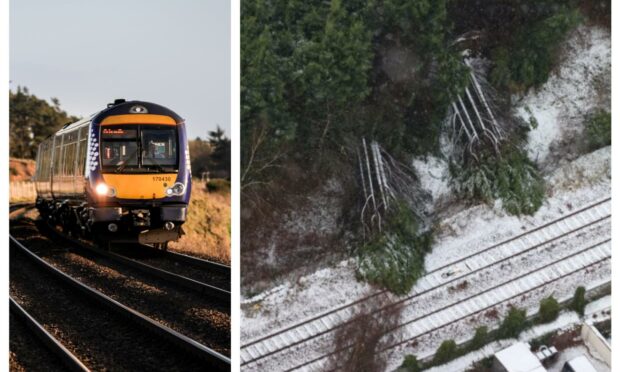An energy firm boss revealed he is “disappointed” customers were given inaccurate deadlines for getting electricity and gas restored after the devastation of Storm Arwen.
SP Energy Network chief Guy Jefferson told MPs investigating the response that agencies coped well in the aftermath last November but could make improvements.
Thousands of homes were left without power for days after the storm, which has been described as one of the worst to have hit Scotland.
Speaking to Westminster’s Scottish Affairs Committee, industry leaders said debris on their roads and phone signal disruption hampered their response.
The brutal gale-force winds reached over 100mph, causing massive damage in Aberdeenshire, along the east coast of Scotland and in northern England.
The Scottish Government confirmed previously they had launched a probe into the storm, with the results expected later this month.
Energy firms ‘could do better’
Mr Jefferson said power restoration times were given to customers with the “best intentions” and most targets were met.
But he admitted that they “could do better” in future if another brutal storm strikes the country.
Scottish Tory MP John Lamont said his parents were left in the lurch without power in the aftermath of the devastating cyclone.
Mr Jefferson said: “We are disappointed that some customers received inaccurate restoration times.
“That’s one of the aspects we’re looking hard at. We had 88% of customers on within 24 hours. In general those customers received an accurate restoration time.
“There were multiple restoration times given to customers and I guess we were definitely guilty of being overambitious with some of those. We had the best intentions.”
A Scottish Power spokesperson said: “SP Energy Networks (SPEN) teams worked to restore power to the 200,000 customers impacted by the storm, often in challenging weather conditions, to connect 89% of customers in the first 24 hours following the storm and 96 per cent within 48 hours.
“However, a significant number of rural customers and communities were without power for more than two days and the company is conducting a full review of its response to the crisis, with particular focus on these areas.
These inaccurate restoration times given to SPEN customers only provided false hope.
– John Lamont MP
“Independently chaired by former UK Energy Minister Rt Hon Charles Hendry CBE, it is evaluating the response to the storm and will determine whether improvements could be made.”
After the meeting, John Lamont said: “These inaccurate restoration times given to SPEN customers only provided false hope rather than solid information.
“This meant that people couldn’t seek other accommodation and ultimately led to a poorer standard of welfare as people lived in their cold and dark homes for days when this could have been avoided.”
Trampolines and sheds blocked roads
Agencies responding to the horrific winds faced major delays due to debris blown onto roads.
Responders were met obstacles such as trampolines and sheds on quiet roads which stopped them from getting to communities in need.
Small towns and villages were left cut off with power outages disrupting phone lines.
SSEN boss Mark Rough said: “We had over 700 high voltage faults and trips on the network.
“In terms of getting to the damage, we took stock on the Saturday and suffered some real challenge around access due to falling trees, but also due to flying debris including sheds and trampolines.”
Mr Jefferson warned rural B roads need further investment to help prevent future power outages.
It was also claimed energy firms and local authorities had a lack of time to prepare since the extent of the bad weather had been unexpected.
A Met Office red warning was only issued hours before the worst of the storm started to devastate the north-east on Friday November 25.
Climate change fears
Storm Arwen was labelled one of the worst storms Scotland has ever seen on record.
But MPs expressed concerns unpredictable gales could become more common as the impact of climate change worsens.
Unusual weather patterns have grown increasingly prevalent across the globe in recent years due to global warming.
UK business and energy secretary Kwasi Kwarteng admitted Britain will have to build a more “resilient system” in years to come.
We have to build a more resilient system.
– Kwasi Kwarteng MP
The Tory minister believes the country should be prepared for “more extreme weather” but believes Tory environmental plans could help stem the worst of the problem.
He told Scottish MPs: “It would take someone foolhardy to say exactly how that will affect infrastructure over the next ten years.
“Clearly we have to build a more resilient system. That’s one of the things I want to do.
“We should be prepared for more extreme weather, and that’s why we’re bringing in more legislation. We’re trying to deal with eventualities as they may arise. It’s challenging.”



